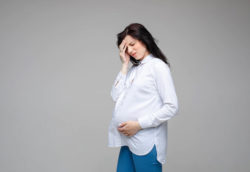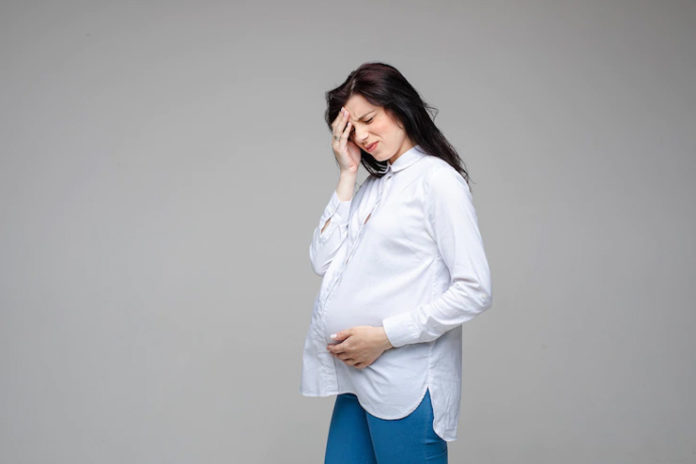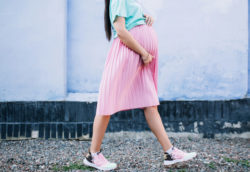Once you realize that you are expecting a child, the first major concern is the health of the baby and that becomes the most important thing for a mother. A pregnant lady requires a lot of care is in order to ensure that the baby remains healthy without any danger. For some, the pregnancy can be smooth and some women may face complications.
Women may experience some unspecific symptoms in pregnancy such as abdominal pain, nausea, and vomiting, one of the common problems in pregnant women is appendicitis which is difficult to diagnose. It occurs due to the inflammation of the appendix during pregnancy.
As appendicitis is common among people of all ages it can be treated and cured easily. To tackle this issue one needs to take utmost care, during their pregnancy as appendicitis can complicate things. So let us find out the symptoms and causes of appendicitis so you can diagnose it as soon as possible.
Appendicitis In Pregnancy
Appendicitis is a finger-shaped pouch, it is caused due to inflammation of the appendix which protrudes from the colon on the lower right side of the abdomen. It is common among people of all ages including pregnant women.
Appendicitis during pregnancy can increase the risk of serious complications and discomfort compared to a normal person. As the symptoms are unspecific and the diagnostic difficulties, in pregnant women the perforation rates are higher, which can affect both mother and the baby’s health.
The chances of appendicitis in pregnancy are usually higher during the first 6 months which are the first and second trimesters. If it is not treated soon as you discover it, it might eventually lead to an infection and result in a ruptured appendix and inside the abdominal cavity. These life-threatening complications increase the chances of fetal loss so be careful and take proper care.
Signs and Symptoms of Appendicitis in Pregnancy
 A common symptom in pregnancy is abdominal pain. When your uterus expands and the ligaments start to stretch, you experience pain in the abdomen. There are also some unspecific symptoms related to normal pregnancy such as abdominal pain, nausea, and vomiting that make it difficult for appendicitis to diagnose.
A common symptom in pregnancy is abdominal pain. When your uterus expands and the ligaments start to stretch, you experience pain in the abdomen. There are also some unspecific symptoms related to normal pregnancy such as abdominal pain, nausea, and vomiting that make it difficult for appendicitis to diagnose.
As the uterus grows the bowel is displaced during pregnancy, and the appendix gets moved. Just by the abdominal examination, you may not be able to identify the abdominal pain. As gestational age in pregnancy increases, the pain starts to move to the upper right side of the abdomen, and that is how the location of the appendix changes. Specialized doctors are required to get appendicitis in pregnant women diagnosed correctly when compared to general patients with pain in the lower right side of the abdomen.
If your doctor suspects appendicitis you will need to have an ultrasound if there is pain in your abdomen. As it is better to understand what is wrong in the first and second trimesters, almost 86% is as good as it is in people who are not pregnant. In the third trimester, it may be more difficult to diagnose appendicitis, your doctor may suggest an MRI scan or a CT scan to help confirm these clinical suspicions.
To identify other possible conditions various diagnoses must be made. Other symptoms a pregnant woman may face like nausea, loss of appetite, flatulence, and abdominal tenderness. As you get infected by the appendix you may experience fever and chills develop.
If you do not treat appendicitis, this inflamed appendix will eventually perforate, or burst and spread some infectious materials into the abdominal cavity, which may result in severe abdominal pain. Immediate medical attention must be taken If appendicitis is suspected during pregnancy.
Causes of Appendicitis
Appendicitis can affect people of any age, ranging from children to the aged. Although the condition is not often observed in pregnant women, it can still be developed during the time of pregnancy. Here are some of the common causes of appendicitis are:
- When there are blockages in the appendiceal lumen, or on the surface, is caused by various internal or external factors. The accumulation of fecal matter causes a blockage in the appendix.
- Parasites like pinworms are present in the intestinal, in digestive systems which cause it.
- Ingestion of foreign objects, like bullets, pins, or stones, which get lodged in the vestigial organ.
- The existence of calcified fecal deposits in the appendix, also known as appendix stones may give rise to this issue.
- Infection is caused due to some disease-proliferating bacteria, like salmonella, measles, or Shigella bacteria.
Apart from these, your genetics does play an important role in the contraction of appendicitis, as it was found that the risk is almost three times higher of appendicitis in those with appendicitis in the family than a person without any past genetical history.
Diagnosis
The above are causes and symptoms that would indicate appendicitis, so expectant mothers with even a doubt should consult the doctor immediately. The diagnosis of appendicitis is a tricky procedure, and the treatment is usually even trickier. Let us understand these methods.
- When a person has detected appendicitis there is an increase in the number of WBCs in the bloodstream of the person. Blood tests are initially done, to find out the number of white blood cells in the person.
- A urine test is also done since appendicitis can result in a urinary tract infection in the person.
- An ultrasound scan, to confirm that the condition is appendicitis is done as the imaging option to carry out during pregnancy.
- If the results of the Ultrasound Scan are not certain then further an MRI scan is carried out. It also carries no risk or radiation, even to pregnant women.
Treatment for Appendicitis in Pregnant Women
Depending upon the condition there are two methods for treating appendicitis in pregnant women. Here are those:
1. Antibiotics
This is done only if the inflammation is mild, and not too worse or bad enough to do any procedure. The antibiotics may be better if it is mild, for better results.
2. Appendectomy
The surgical removal of the appendix during pregnancy is referred to as appendectomy. This procedure can be done through a keyhole surgery if the mother is in the first or second trimester, but for women in the third trimester to ensure no lasting or major damage, a larger incision is required.
What Happens After the Surgery?
After the surgery, care needs to be taken and the mother is expected to not do any heavy and stressful activity, best thing for their health is to take a rest for some time, after the surgery. The response of the baby is monitored by the mark and after an appendectomy.
Also, during pregnancy, it is observed that most women undergo preterm contractions. However, this does not usually result in preterm labor.
An appendix is a threat to the health of both, the mother and the baby, especially during pregnancy. One needs to treat it with utmost care. The condition can have severe issues if left untreated, so it is better to consult an expert if you even have a slight doubt and facing any kind of symptoms regarding this.
Conclusion
Pregnancy requires utmost care, and for a mother, the health of the child is everything during this time. It is better to always consult your doctor if you are facing any pain or even the slightest complications. An appendix is a threat to the health of both, the mother and the baby, especially during pregnancy. So hope this article has helped you in understanding all the necessary information on appendicitis during pregnancy.








































